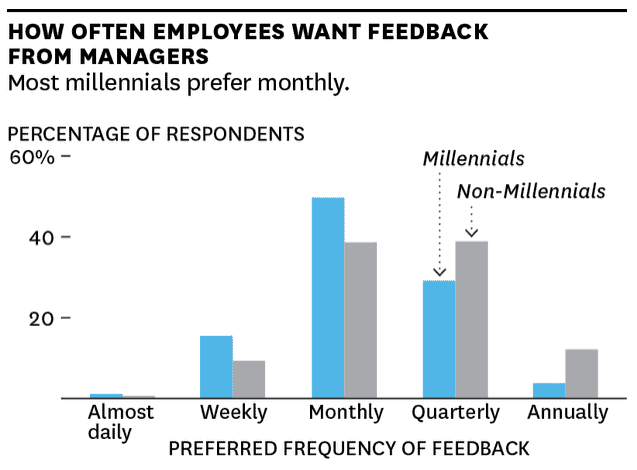Silence. It's easy to take for granted that not hearing anything is a good thing. That being hands off as a manager means your team is happy because you're not micro-managing them. Yet, there's a fatal flaw in that approach.
Not micro-managing, and communicating sufficiently are two very different things. If you're not giving your team feedback regularly and soliciting their feedback, there's a lot you won't know. And what you don't know can hurt you.
It's easy to take just a few signs you see and think that everything is fine when there's problems brewing. You can also take one comment to mean too much when a regular dialogue would have helped.
Your team wants Feedback.
Imagine you just spent days (or weeks) working hard on a project. You checked all the little details and put all your skills and passion into it. Then when you submit it, no one says a word. You are just handed your next task. How would that make you feel? Does that make you want to put that same effort in again?
Now, let's flip it. You got sick, or distracted, or something else came up and you didn't do your best work. In fact, you just winged it and barely got by. Yet again, when you submit the work, no one says a word. Does that mean it was good enough? Does that mean no one cares about your work when you normally work hard?
Without feedback, this is what your team members experience every day.
Even good companies struggle with feedback.
I was just talking to a manager at a Silicon Valley company the other day, and despite the usual awesome perks, open offices, and a successful, growing business, everyone wasn't happy in the annual company survey. Did they want tastier free lunches? More unlimited vacation? Better corporate swag to wear? Nope. All they wanted was more feedback from their managers.
More on them later.
Millennials *really* want feedback.
Every generation is a little different. They're shaped by what they experience. As technology has evolved, things move faster. Gone are the days of lifetime employment at one company, so is it any surprise that the generation that doesn't see lifetime employment and was raised on rapid access to information wants more feedback?
As this study from SAS shows, the majority of Millennials expect feedback at least monthly, and many want feedback even more frequently. And coincidentally, 2015 marks the year that Millennials become more than 50% of the total workforce. Not managing in a way that works for Millennials would be devastating to your company growing its own talent.
Your best people often need the most feedback.
Especially early in their career, I've found many of the best people are deeply insecure in their abilities and unsure of how they're doing. Whether they're unsure because they're new, suffering from imposter syndrome, or intimidated by colleagues, it's easy to be nervous. You can help them with just a little feedback on both what they're doing well, and helping them recognize what and how they can improve.
If you can't afford to lose your best person and you value them greatly, make sure they know they're wanted. In the leadership classic, Dale Carnegie's "How to Win Friends and Influence People", Carnegie relays a great story that shows even 80 years ago feedback mattered:
"Claude Marais, a restaurant owner in Rouen, France, used this principle and saved his restaurant the loss of a key employee. This woman had been in his employ for five years and was a vital link between M. Marais and his staff of twenty-one people. He was shocked to receive a registered letter from her advising him of her resignation.
...I was under the impression that I had been fair to her and receptive to her needs...I probably had taken her too much for granted and maybe was even more demanding of her than other employees.
...I took her aside and said, "Paulette, you must understand that I cannot accept your resignation. You mean a great deal to me and to this company, and you are as important to the success of this restaurant as I am." I repeated this in front of the entire staff.
Paulette withdrew her resignation, and today I can rely on her as never before. I frequently reinforce this by expressing my appreciation for what she does and showing her how important she is to me and to the restaurant."
When you take someone for granted, they can feel unappreciated and seek out other jobs to feel loved; after all, when do you get more love than when a company is trying to convince you to join them? You can avoid competing with that kind of courtship by making your team members feel important and giving them the feedback that lets them know you care.
How much is enough feedback?
So we know already that especially Millennials want feedback approximately weekly, but what is the right mix? It turns out, the highest performing teams have a praise to criticism ratio of approximately 5.6 to 1. It sounds like a lot, but think about how just a little praise can make you feel? When you are recognized for good work, it makes you want to do more of it.
And before you worry that this is all just warm and fuzzy, everyone-gets-a-trophy BS, realize it has a real, measured affect on your bottom line. A Gallup study found that those answer yes to, "In the last seven days, I have received recognition or praise for doing good work" is responsible for a 10% to 20% difference in revenue and productivity.
Give the right feedback to your team.
"Good job" or "You did that poorly" are both equally lacking in value to the team member you give that feedback to. You must be specific in your team feedback.
If you really like your marketing manager's blog post, take a second to recognize why. Was it how it was structured? The research that was a part of it? The conversions it drove? Take an extra minute to specifically recognize an aspect of it that you'd like to see more of. If you do, I bet you'll see more of it from them, which is exactly what makes praise so powerful.
The same applies if they didn't do something well. Part of being a manager is coaching and developing your people and the only way people get better is if you can help them identify how they can improve. Take a hard look at why something wasn't up to you and the company's expectations.
It takes the sting out of criticism when you make it about something in their work, and not just them. Then, it's not "you are a bad software developer," it's "the way you commented your code makes it impossible for your coworkers to understand it."
Developing people and seeing your team perform at a high level that delivers results is the key responsibility of a manager. Giving your team feedback the right way is an essential part of accomplishing this.
Who has time for this? You do.
You're hopefully having one on ones with your team (if not here's why you should), but there's a good chance you're not making the most of them. Maybe you're filling them with status updates or just talking randomly based off of a simple question like "How are you doing?" No matter what you do in your one on one time now, giving feedback to your team should be a key part of the meetings.
That Silicon Valley company I mentioned earlier? They overhauled what they expect of their managers. Now feedback is a key part of their one on ones and it's already had a big impact; team members are showing strong improvement after previously struggling, and both managers and team members feel like their one on ones are a better use of time than before the change.
The interesting thing this company did though was that they also added another meeting. See, if you give someone helpful feedback, there's still work to be done to help enhance and develop the skills you discuss. If you're not careful that never happens and then the feedback didn't really accomplish much unless the team member can figure it out completely on their own.
Your one on one is great for surfacing the issues and reinforcing what's going well. But with only 30 to 60 minutes every week or two, it's unlikely to be enough time to really dive into the actual coaching if it's more than a quick tweak. That's why they have a separate meeting that ensures it's on both the team member and manager's calendar to have a coaching session to build on their one on one.
Maybe you don't have time for a standing coaching meeting always on top of the one on one, but there's no reason not to make the investment to make the most of your one on one and do as much as you can there. This is why legendary Intel CEO Andy Grove wrote,
"Ninety minutes of your time can enhance the quality of your subordinate's work for two weeks, or for some eighty-plus hours.”
Don't forget to get feedback, too.
You're human, too. Don't forget to ask for their input as well. Find out what they like and don't about what you're doing and you'll grow trust with your team. You don't want your team to fear you and certainly if there's something you can do to make your team perform better you want to know. Don't forget to ask. If you're unsure how to ask them, these one on one questions can help.
Are you and your team operating in silence or are you creating dialogues for feedback both ways?
What you don't know and don't share with them will cost you.
Want to continue learning about 1 on 1s? This post is one of dozens we have to help you be your best in any situation. Find our comprehensive guide to one on one meetings here.




